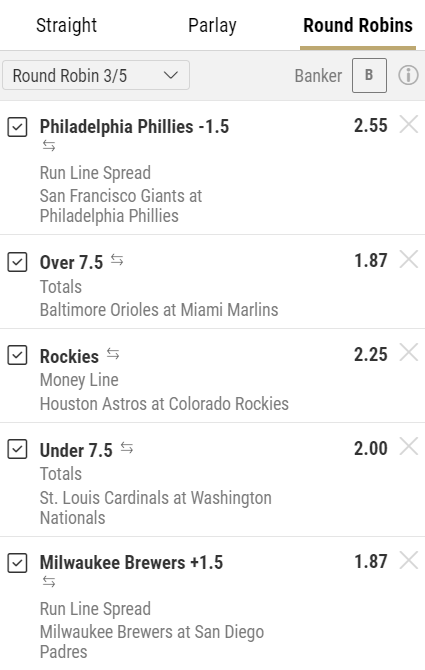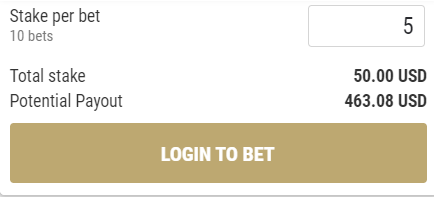An introduction to System Bets – how permutation bets work

In this guide, we will dive deep into the world of system bets. What are these wagers, also known as permutation bets and what’s the best way to play them? Let’s find out, but first, if you're new to betting then you might want to check out our general How-To guide here that has all the basics!
Best USA Sportsbooks For System Betting
| Rank | Partner | Bonus Amount | Review | Link |
|---|---|---|---|---|
| 1 |

|
Bet £10, get £10 | Review | Visit |
| 2 |

|
Bet 10, Get 10 + 50 Free Spins | Review | Visit |
Table of Contents
What is a System Bet?
A system bet is a type of wager that is similar to a Parlay bet. This is because several selections need to be made. But the key difference between a System and a Parlay bet is that not all of the named picks in a System Bet have to win for the wager to return something. In contrast, with a Parlay, it is all or nothing.
Let’s look at five basic sports betting picks from a big night of NBA action along with some odds:
- Detroit Pistons -200
- Boston Celtics - 12
- Phoenix Suns -188
- Toronto Raptors - 175
- Brooklyn Nets -225
Those five picks are examples. A System Bet is generally between three and eight selections (but can be more) that are linked together in a single wager. But it's not tightly linked to the extent that if only one of the selections fails, the bet will be a total wash. Again, the key factor with permutation bets is that something will be returned even if every selection isn’t successful.
What does that mean for you?
As a punter, you can think of a System Bet as a little bit of insurance or coverage. You can call the shots on the bet in naming the rows, which are built from the picks. What are rows? They are a type of bet within the System Bet.
For a System Bet, you will likely see something like a ⅗ or ⅖ permutation. It’s a simple read on that. The second number is how many picks in total have been made. The first number is the type of bet that is being played (a double, a treble, etc).
Let’s look at some examples of some permutation bet options, remembering each double, treble, or whatever type of bet that’s created within, is called a row.:
- 2/5 = All doubles (rows) that can be created from five selections are played
- 3/5 = All trebles (rows) that be created from the five selections are played
- 4/8= All quads (rows) that can be created from the eight selections are played.

How to play a System Bet
First off, you're going to need an account with a US Sportsbook who offer system bets.
For each double that is created in a 2/5 System Bet, a unit of the stake will need to be applied.
- Ten double bets are created in a 2/5 system so that’s 10 rows of stake.
So you are either going to calculate how much stake in total you are playing that will be split between the number of rows. Or decide whether you want a certain stake, say $5 going to each row in the System Bet. In this example, $5 x 10 rows is a $50 stake.
So there’s the trade-off against the extra coverage that a System Bet brings compared to a Parlay Bet. The latter is usually played with a small stake. Extra coverage in sports betting always means an extra stake or a sacrifice of odds.

Do I need to play a banker?
That’s a common question about System Bets and it’s a personal choice. A banker is a selection that is nominated in your System Bet. It is usually the one which is most likely to win. The point of that is to try and boost returns.
In a 2/5 System with a banker, at least two of the picks would need to be correct, plus the banker. If it’s at least two correct picks without the banker, then the bet won’t win. The banker raises the potential odds but adds another level of risk.
In case you might be asking yourself…
Do I need only 2 of the five selections to win for the bet to pay out in full? That answer will be no. If you get at least two of the five picks right, then the bet will return something. If only two picks are correct, only one double bet is successful. For the full wager to be paid out, it would need all five picks to be correct.
- Two of Five Picks = 1-row wins
- Three of Five picks = 2-rows win
- Four of Five picks = 6-rows win
- Five of Five picks = 10-rows win.
What are the standard odds for a System Bet?
There’s no set answer to this one. How a System Bet is played, will be down to personal preference. You could build a 3/4 System Bet for example, with all selections at +250 on the money line. But that’s a lot riskier than picking all favorites at -125 which would generally be a more solid bet.
For comparison from our five bets above, let’s compare potential pay-outs from a $100 stake:
- Parlay = $4007.64
- 2/5 System Bet = $432.27
- 10 Doubles ($10 stake each) = $472.
The System Bet doesn’t pay out as much as a Parlay from the same stake, but given the far riskier nature of a Parlay, it’s unlikely that the big stake would be outlaid. As you can see, 10% of the stake going on the Parley would return roughly the same amount as the 100$ stake on the 2/5 System Bet. But again, it’s a riskier bet.
The total pay-out of a permed bet will depend on the odds of the winning selections within the wager. A two short-priced favorites of five-will pay out less against two longer-priced underdogs.
- Some common System Bets are 2/3, 2/4, 3/4, 3/5, 4/5, 4/6, etc
That’s just scratching the surface of what different System Bets can be created. Not all of those selections have to win to get something back. So that can often lead to higher winning percentages from System Bets, certainly compared to a Parlay.
System Bet vs Other Similar Wagers
We have already touched upon the similarities and differences between a System Bet and a Parlay. The other bets that would be a sort of comparison are multi-bets.
Think full perm bets such as Lucky 15 which covers all types of bets that can be created from four selections (singles, doubles, trebles, and parlay).
You have the more basic options of straight doubles or straight trebles as well, to a lesser extent. That’s stripping away some of the back-up plans that the System Bets introduce as a straight treble would need all selections to be correct.
So the good news
System bets are not scary betting beasts that are only for seasoned pros. Far from it, they offer beginners a very good, creative entry point into building permutation bets. You can head right now to a sportsbook, get those selections into the slip and look at perming those real odds
Remember that it's about the types of rows (doubles, trebles, etc) that are created from the selections. You can choose the rows. One of the big benefits of a System Bet is that it can be created to fit your betting style. You can formulate exactly what you want, from solid-looking odds-on favorites to the riskier underdogs. The blending of underdogs and favorites into a System Bet is a common practice.
Perm bets are easy to understand, accessible, and worth diving into. So now that the basic information is in place on how to play system bets, it’s time to take on the bookie with a carefully crafted and personalized System Bet.















